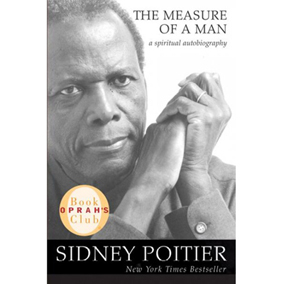Iconic American actor Sidney Poitier has a recent autobiographical work titled, The Measure of A Man: A Spiritual Autobiography that’s sure worth the read. Previously having written This Life in 1980, this more recent autobiography offers an introspective look into his life as a whole, as opposed to the sole focus on his Hollywood career that This Life encompassed.
Why did he write this autobiography? This is what Poitier has to say:
“I have no wish to play the pontificating fool, pretending that I’ve suddenly come up with the answers to all life’s questions. Quite that contrary, I began this book as an exploration, an exercise in self-questing. In other words, I wanted to find out, as I looked back at a long and complicated life, with many twists and turns, how well I’ve done at measuring up to the values I myself have set.”
The Measure of A Man touches on Poitier’s personal and professional career from the childhood plagued by poverty in the Bahamas, to his elevation to stardom as an American film actor years later. He speaks of the values his parents instilled in him that went on to shape who he would grow to represent both on and off the screen.
The book begins with a present day Poitier frustrated by the lack of intriguing shows on late night television while attempting to fall asleep before still-shots of his childhood begin to flood his memory. He shares stories of his family, career, and personal life while frequently transitioning into thought-provoking, conversational narrative. It feels as if throughout the entire book you are traveling with him through his memories, engaging his thoughts and learning from his wisdom.
His book inspires us to look further within ourselves to realize who we are and challenge who we ultimately want to be. It is to be understood that by nature we are imperfect and thus mistakes will be made but it is our values and faith in who we are that prevail. His depiction of growing up in poverty to eventually becoming the first African-American to win an Oscar for Best Actor in his historical role in Lilies of the Field, offer humbling representations of one man’s self-motivated defiance of failure.
His roles, often designed to push the boundaries of prejudice in America, defined who and what he stood for, a strong family man firm in his spiritual and moral values. He writes, “…we puny individuals have only seventy-five or eighty-two or ninety-six years to look forward to, which is still a snap in the overall impenetrableness of time. So what we do is we stay within the context of what’s practical, what’s real, what dreams can be fashioned into reality, what values can send us to bed comfortable and make us courageous enough to face our end with character.”
This is a great LiveTrue Book. If you want to go on a spiritual quest of another that will stir you to wonder what foundations to model your own life after, The Measure of A Man is the perfect read.

